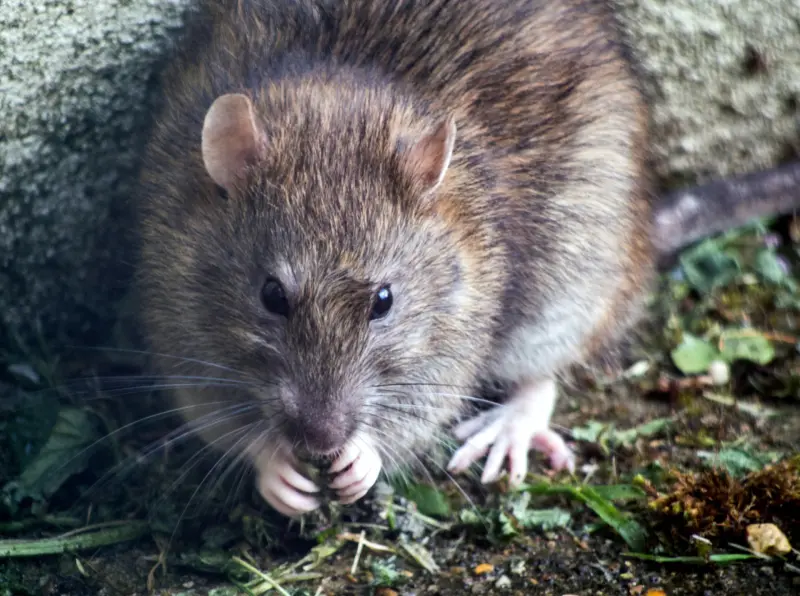This article looks at what is the most effective rodent control? We look at how mice and rats damage homes and most effective rodent control methods.
About Rodent Control
It can be incredibly distressing if you have rodent activity in your home, and you want to prevent more from entering and causing more disturbance. We all experienced rodent problems at one point or another, but you can put many preventative measures into place.
Understanding rodent control and pest control for mice and rat infestations are vital to preventing future problems. If you can keep rodents away and prevent them from entering your home in the first place, you will experience a much healthier and hygienic home environment.
Rats and mice are more than just creepy critters in your home; they carry deadly diseases and pose a serious threat to humans.
E.Coli, Salmonella, and Lymphocytic Choriomeningitis (LCMV) are among the diseases they have, spreading them as they move around your home.
For this reason, controlling rats and mice in your home is vital before diseases spread to your family.
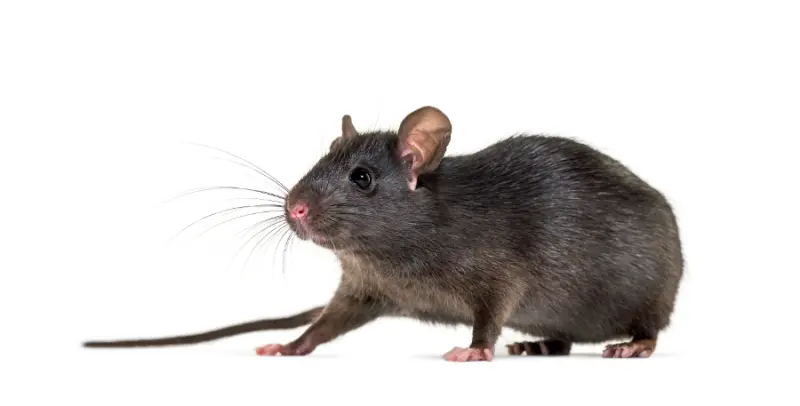
There are some telltale signs when a rat or mouse is present. They gnaw and chew on anything they can, from electrical wiring to firewood and insulation, leaving droppings and illness wherever they go.
As they are attracted to food, you can experience food poisoning if their droppings are located near food sources or if they have simply passed through the kitchen. You can identify rodent droppings by their shape and size. Mice will produce anywhere from 30-50 fresh droppings per night, which are small and brown. Rat droppings are larger, sometimes twice as long and can be similar to a grain of rice.
While you can install traps and use poisons and chemicals to eradicate rodent infestations, this will not prevent mice from invading the following year.
You should still inspect all cabinets, doors and closets that could lead to crawl spaces and connect to the home's exterior, as these are common access points for rodents. Sinks and pipelines also allow access and entry points, so check all holes and cracks around the kitchen, windows, and doors.
How Do Mice and Rats Damage Homes?
There are many threats when mice are present in your home, and without further pest control assistance, you can experience significant property damage.
The rodent family constantly needs to chew as their incisors are consistently growing. They can grow up to 2mm every week, meaning they must chew and gnaw on anything they can find, ranging from plastic, cardboard, wood, copper, aluminium and even brick in some cases.
For this reason, keeping food away from their sightline and stored in sealed containers is best to prevent food poisoning and waste. The faeces they leave throughout your home can get into all your food storage areas, so be sure to lock it away as securely as possible. They don't stop with food, though, as they will chew and destroy anything near their nest.
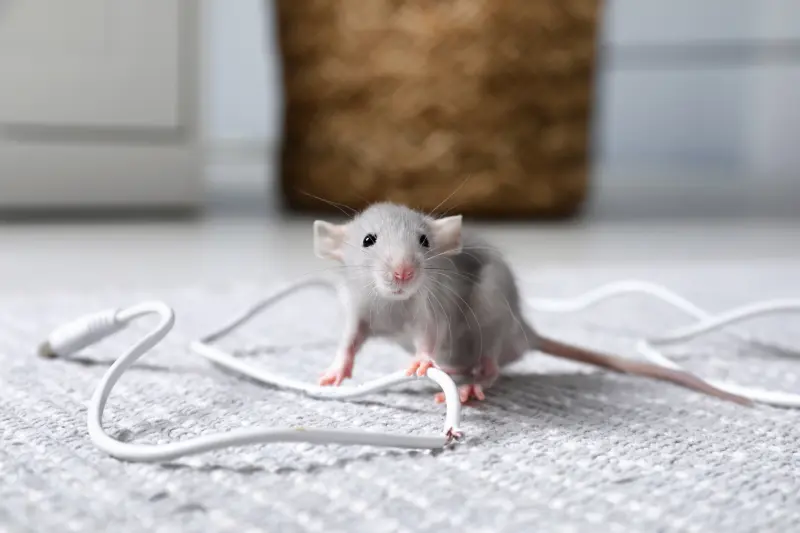
Nesting materials are created, and they will burrow deep into insulation in your roof, basement and other hidden areas in walls and floors. Insulation cavities provide security and warmth, two things they require.
With nests in an attic, for example, you could find that many of your belongings in that space are now unusable and destroyed, whether that's from the strong urine smell or the constant chewing.
If you have valuable items of sentimental or monetary worth in your home and you believe mice are infesting, you need to clear them as soon as possible before the damage is caused.
The smell produced by rodents can be enough to damage furniture and properties, too, especially if they begin to create urine towers. They urinate incredibly frequently, which, when combined with dirt and grease, can create small mounds of foul odour, spreading throughout the entire home.
Dead rodents can create smells and attract other pests such as flies and fleas, acting as a breeding and feeding ground for more rodents. Controlling mice while there are fewer numbers can prevent this from occurring.
Most Effective Rodent Control Methods
There are a few steps and precautions you can put into place to get rid of rats and mice in your home. These can also help with rodent control in the future.
Sanitation
Good sanitation and hygiene in your home are crucial in keeping all pest variations away. This goes for your food sources along with general maintenance and cleaning of your kitchen, bathrooms and other regularly used spaces.
This doesn't have to involve losing your lifestyle and routine to cleaning, but it's about viewing your space and home differently.
Storing your food in sealed plastic boxes, clearing any food scraps, crumbs and spillages, ensuring no pet food is left out and dry, and putting away all crockery after use are some things you can get started with.
You should take special care around your rubbish bins as this is the area that pests generally will congregate. Pests and rodents are attracted to the warmth and shelter of your home, along with the potential food sources on offer.
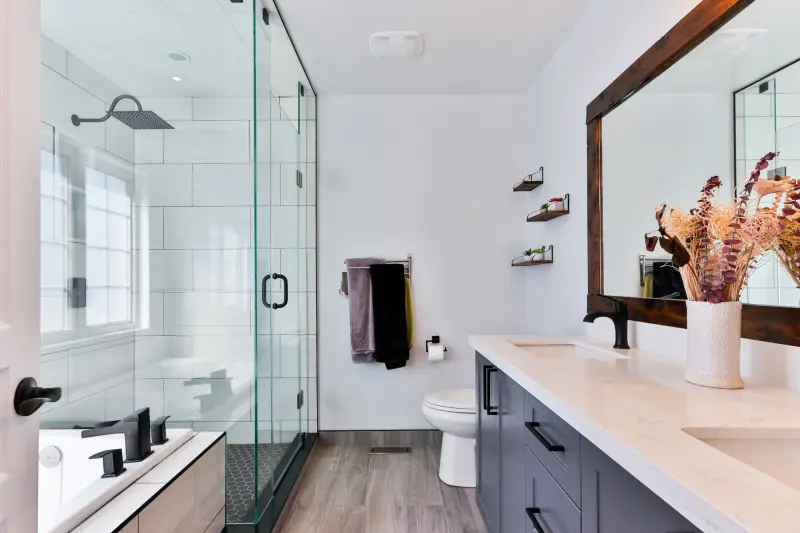
Almost more important than food is water, and mice and rats love the plumbing systems we have in our homes. Rats especially need a constant water supply; otherwise, they will not survive. If you have any leaking taps or pipes or know of areas that collect water, be sure to fix those issues to stop rodents from entering your property as often.
Rodent-proofing
Good hygiene, cleaning and sanitation can only get you so far, however. If you are not rodent-proofing your home, you can experience a rodent infestation even with proper sanitation methods in place.
The process of rodent-proofing starts with a house inspection, ensuring you cover the roof, windows and doors, including door frames. If you have a basement, don't ignore that either, as rodents enter through the smallest and strangest of holes.
Take time to seal every spot you see as a potential entry point for mice and rats, as they can sneak through the smallest of gaps. To prevent further entry, all holes should be covered with aluminium netting or stuffed with steel wool, mesh or gauze.
Rodent repellent can take you a step further in stopping them from being outdoors around your home, in the garden and along the exterior wall. This can have an inoffensive smell to humans, with many leading products smelling of peppermint as they are the most effective rodent control method.
Natural rodent repellents can be planted and grown in the form of daffodils, camphor and wood hyacinth, and you will see a positive effect on rodent population and infestations. Cayenne pepper and cinnamon can also be used.
Hunting Rats and Mice
If none of the above solutions seems to work, and your home is as sanitised and rodent-proofed as possible, you may have to find new ways to remove these pests from your home. Of course, many of us want the rodents to be humanely killed in the process, which is of utmost importance to us.
Natural predators
There are many natural predators that pose a threat to mice and rats, and you can have some as pets. Cats can provide some security and defence against rats and mice, but this depends on the cat's personality as some are not natural rodent hunters.
You can also attract barn owls to your garden by installing a shelter box, and they can act as rodent repellents. A family of barn owls can eliminate several thousand rats and mice throughout their nesting season, deterring future populations from entering your garden.
This natural rodent control can be preferred to buying new traps and pesticides regularly but isn't a guaranteed success but can help control mice populations.
Ultrasonic rodent repellents
If you're looking for a more humane repellent option, you can invest in an ultrasonic trap that emits ultrasonic sound waves across the area. Mice and rats will run away from these noises as it causes distress and discomfort to them, so you can install them and open all windows and doors to remove rodents from your home.
They do have a limited range, however, and cannot emit the sound through walls, so you must install a new device in every room you believe mice to be present in. This will have a significant effect initially, but some rodents have been noted to get accustomed to the noise over time.
Rodent traps
You have probably used some variation of rodent traps over the years, as they are one of the most effective ways to deal with mice and rat infestations. Whether this was some electric trap, snap traps or a live trap, there are options depending on your approach.
A snap trap is the most common variation and works via a trigger mechanism and bait to immediately trap and kill the rodent. However, a single snap trap can only kill one mouse, so you will need more for greater numbers. Many people realise the importance of not providing a slow and painful death, and all leading traps on the market will kill rodents immediately without further harm.
Electronic traps work via electric shock and ensure instant elimination, while you have the option of stick or glue traps and live catch traps which can be more humane if you plan to release the rodent.
Live traps work on a trigger mechanism, trapping the rodent in the cage and can only be released once you get to it.
The only downside is they can only be used once. You should place traps around bins, holes, along walls and other areas you believe the mice to travel between.
The food bait can consist of cheese, peanut butter, ground meat or even bacon to attract rodents to the trap. There are other traps available for specific situations, but you should ask a pest control expert beforehand.
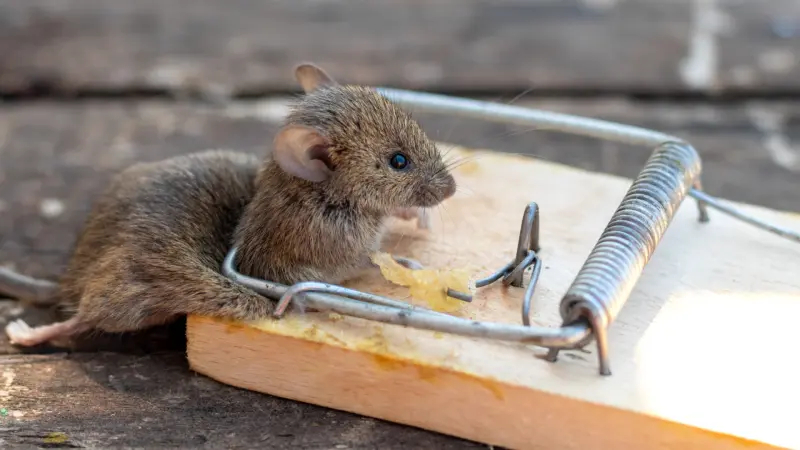
Rodent poison baits
Finally, you also have poison baits or rodenticides. These lethal chemicals are extremely effective at dealing with a large infestation but are the least humane option.
They can be harmful to the surrounding environment, children and pets, so you should contact a pest control specialist before using them. Many pest control companies have chemicals, treatments and products that you cannot buy over the counter, so they can deal with the problem for you and have a greater understanding of disease control.
If you are experiencing a large rodent infestation, you will benefit more from hiring a pest control service than attempting to deal with it yourself.
Maintaining Rodent-Free Properties
You must continue to complete these steps well after the infestation has been removed, as mice and rats will attempt to enter your home again. Inspecting for entry points and sealing them with metal mesh will help prevent further access, along with understanding how they move throughout the home and keeping food locked in sealed containers.
If you make your home as unappealing to mice and rats as possible, you will prevent rodents from entering. Store food in a secure container and ensure everything is clean, perhaps using peppermint oil odours also.

Your rubbish bins should be kept shut, ideally even locked, as pests of other species and animals will attempt to get in. Your compost bin is another risk for attracting pests, so these should be kept isolated.
Even something as innocent as having a bird feeder in your garden can attract rats and mice, so you will have to find a way to rat proof this too.
Pet food should not be left on the floor overnight, as this is an ideal area for mice and rats to nest around and feed on when you're sleeping.
Mice will chew on anything they can find, so if you're leaving paper, cardboard and even firewood in easily accessible places, you will notice more gnaw marks and signs of mice around.
The pest control industry has many years of experience on rat control and can deal with your problem with ease. Every dead animal must be removed safely and efficiently from the property when killing rats or mice, and an exterminator can ensure this process doesn't lead to more pests entering.
If you require further pest control assistance and need rodent control services, please reach out to our qualified team today. We can provide more tips and deal with larger scale infestations.
Pest Control Hampshire are pest control specialists working throughout Portsmouth, Southampton, Basingstoke And Hampshire. Contact us for pest control Portsmouth.
Follow the links below to find a pest control specialist to help resolve your pest infestation.

